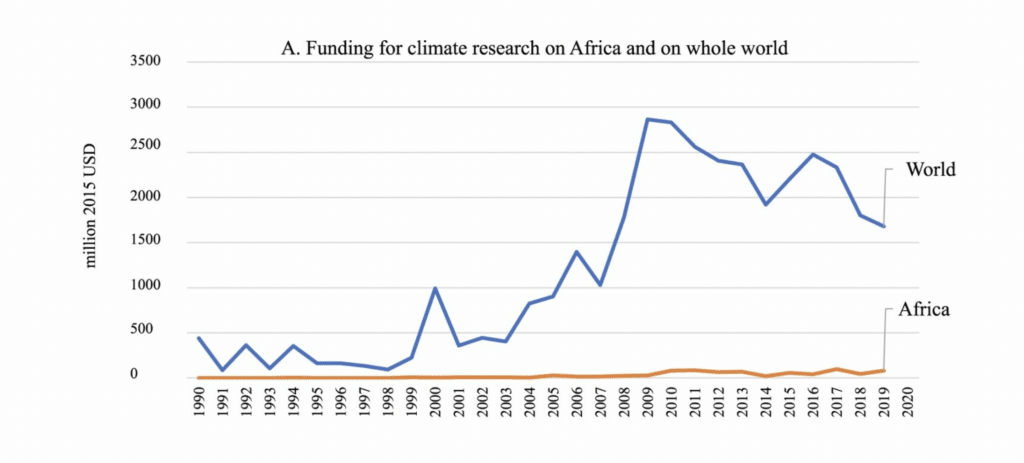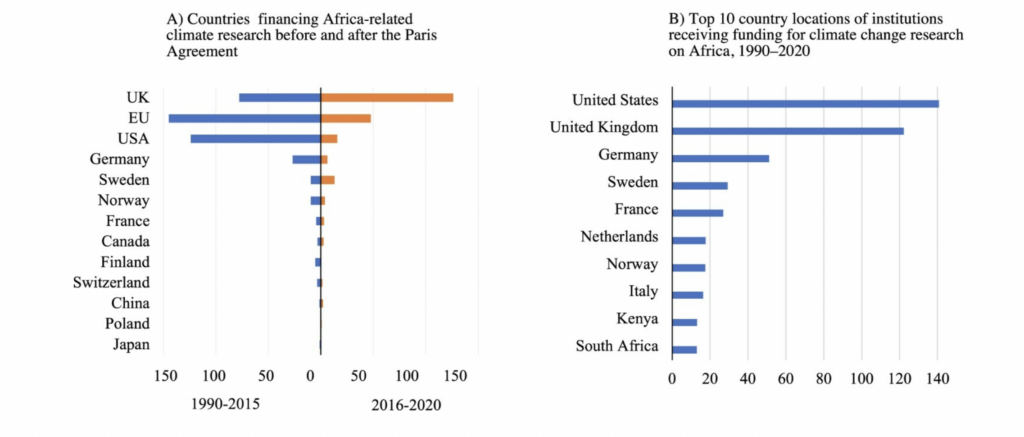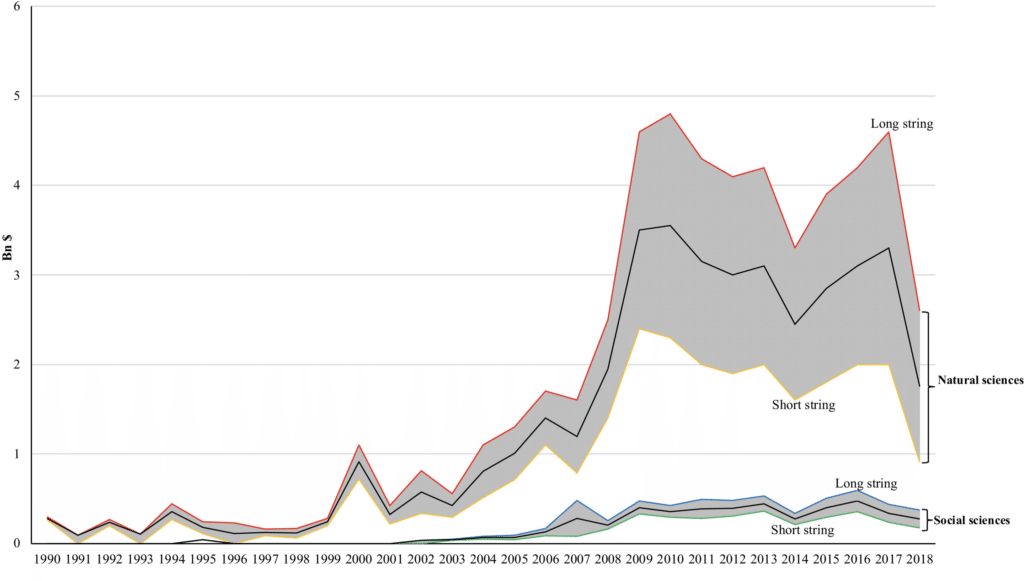Two studies have mined data from Dimensions to uncover striking imbalances in climate change research funding.
Melting ice caps, rising sea levels, extreme weather events, and droughts: these are some of the climate change scenarios currently playing out across the globe. But another chapter is unfolding as we grapple with the effects of climate change – a tragedy of inequalities. Countries, populations, and communities that have contributed the least to greenhouse gas emissions are the first in line to face the extreme brunt of climate change impacts. The effects of climate change are global and are expected to leave no area in the world untouched. However, there is growing scientific consensus that climate risks will disproportionately affect the world’s most vulnerable populations and communities. As agendas and policies are set and promises for more funding made, it has become crucial to analyze some of the past decisions that have set the stage for the exacerbation of inequalities. It might be time to reflect on who sets the agendas, who has access to climate change research funding, and what areas of climate change research have been prioritized.
Two first-of-their-kind studies have looked into the different aspects of climate research funding flows: one published in Climate and Development, titled Funding flows for climate change research on Africa: where do they come from and where do they go? analyzed the funding for climate change research in Africa. The second, The misallocation of climate research funding, appeared in Energy Research & Social Science and delved into the fund distribution data in social sciences. For both studies, authors mined data from Dimensions, the world’s largest database on research funding flows. Speaking to the author of this blog piece, Indra Overland, Research Professor and Head of the Research Group on Climate Energy at the Norwegian Institute of International Affairs and the lead author on both the papers said, “The detailed categorization of data in the Dimensions database was very useful for both papers, including categorization by field of research, funding country, and country of the researchers carrying out the research.”
Africa: the unfortunate poster child of climate inequalities
“We were interested in how much of funding for climate change research is spent on research on Africa, research being carried in Africa by African researchers, at African institutions, etc.,” said Overland, explaining the motivations for the study. “These questions are important because anthropogenic climate change is overwhelmingly caused by wealthy countries and some middle-income countries like China, and African countries have contributed a vanishingly small share of emissions. Unfortunately, however, African countries are the ones that are extremely vulnerable to climate change. And so this research and its results relate directly to key climate justice issues,” he explained.
To analyze the funding data, Overland and his team used Dimensions and gathered data comprising USD 1.51 trillion of 4,458,719 research grants from 521 organizations worldwide. The data, ranging from 1990 to 2020, covered all research fields. Their findings, which now form a crucial part of the Intergovernmental Panel on Climate Change’s (IPCC) Sixth Assessment Report, Climate Change 2022: Impacts, Adaptation and Vulnerability, show that from 1990–2019, research on Africa received a meager 3.8% of climate-related research funding globally. And of this 3.8% funding for climate research on Africa, 78% went to EU and North American institutions, while African institutions received only 14.5%.

Some direct results of this imbalance in funding are a dismally low number of publications led by locally-based authors and a lack of attention to African priorities. Moreover, because most major funding agencies and donor organizations are based in the UK, the US, and the EU, the research agendas and knowledge gaps are defined through a “Northern” lens. “Recognizing Euro-American centricity and ongoing power imbalances both in causing climate change and in how climate research is produced and used is an important first step,” the authors write.

Social Sciences: the neglected piece of the climate change puzzle
For the study on the misallocation of climate research funding, the authors conducted an in-depth analysis of funding allocation across research fields. One of the key findings was that social science fields are critically underfunded. The authors looked at data collected between 1990 and 2018 and found that the natural and technical sciences (STEM fields) received 770% more funding than the social sciences for research on issues related to climate change. “One may think this makes sense because STEM produces much more concrete and practical results. This assumption may be true for some areas, but when it comes to climate change, the big challenges now are not scientific or technical,” said Overland.

To make their case, the authors analyzed a dataset derived from Dimensions that comprised research grants from 1950 to 2021, spanning 4.3 million awards with a cumulative budget of USD 1.3 trillion. Their results revealed that in the period between 1990 to 2018, the natural and physical sciences received a total of USD 40 billion compared to only USD 4.6 billion for the social sciences and humanities. And of all research funding, only a minuscule 0.12% was spent on the social science of climate mitigation.
According to the authors, this striking imbalance in funding priorities is a significant hurdle in reaching climate goals when time is running out. They argue that the current natural science knowledge of anthropogenic climate change is sufficient to take action. The technologies we already have today are adequate to solve the problem and are developing rapidly. “The real challenge now is mobilizing sufficient political will among decision-makers and wider populations to consider what we already know and take appropriate action. This is the domain of the social sciences, and STEM cannot solve this problem. It is, therefore, necessary to invest more in the social science of climate mitigation,” said Overland. The authors conclude that “Framing climate change more as a global social challenge that cuts across disciplines will expand the scope of research, its ability to offer critical insights and its social legitimacy among a broader base of stakeholders.”
Addressing and acting on missed opportunities
In an interview, the outgoing chief of the United Nations’ (UN) Green Climate Fund, Yannick Glemarec, underlined the need for wealthy donors to fix obsolete funding distribution channels. Understanding the current funding patterns is a step in that direction. The next and more crucial step would be to work to rectify the imbalances that plague climate research funding. Both studies discussed here reveal that the fight against climate change faces significant funding inequalities and prioritization challenges, both in terms of regional focus and thematic prioritization. As the stage is set for COP28, the United Nations Climate Change Conference, slated for November 2023, countries across the globe will seek to assess the progress made on the Paris Agreement. If the data are to be believed, then addressing funding inequalities and prioritization challenges will be crucial to ensure a fair and comprehensive response to climate change and work towards limiting global warming to 1.5°C.
Would you like to learn more about how you can explore the impact of funding with Dimensions?
The Dimensions database was chosen by the researchers of these papers for its breadth and depth:
“We use the Dimensions database, which provides access to data that are unprecedented in their scale and richness. This makes it possible to take research to an empirical level that has previously been unattainable.”
